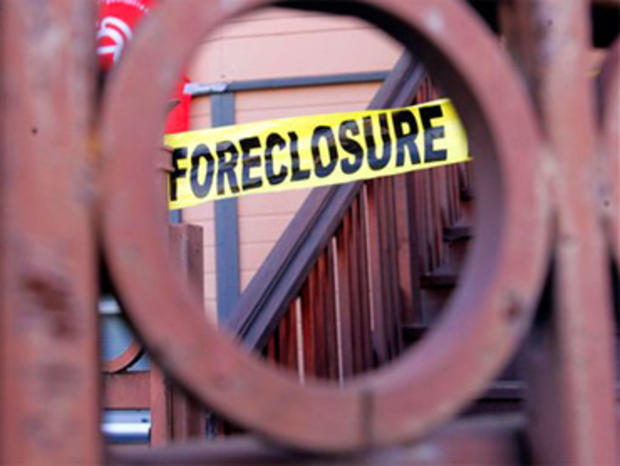Behind the Foreclosure Numbers: "Strategic Defaults"
Guy Campanile is the business producer for the CBS Evening News.
In 2006, I endured a four hour predawn flight to Denver followed by an hour long drive through a blizzard to meet with a real estate agent in Greeley, Colorado. At the time, Weld County was the foreclosure capital of the United States.
I was there to try and find out what was going on. "Subprime" was still months away from entering the national conversation.
Yet there I was, shell-shocked by seeing block after block of foreclosed homes.
I remember the real estate agent's warning that day -- "See this? It's going to spread everywhere."
Four years later there are signs the foreclosure crisis may have reached its summit. Realtytrac's latest report on foreclosure filings shows a spike in defaults.
March was the worst month ever for foreclosure filings (367,056 properties). What's really striking is the number or bank repossessions in the first three months of 2010 - a 9 percent increase compared to a 13 percent decline in the first quarter of 2009.
There are a couple of reasons explaining the foreclosure and repossession spike. Banks are finally making a dent in the backlog of distressed inventory. The extraordinary length of unemployment for many Americans is pushing more homeowners into default. Many who had been in a temporary mortgage modification programs failed to qualify for permanent modifications. Finally, some homeowners are choosing to miss monthly payments rather than pour more money into homes that have lost 30 percent in value. Bankruptcy attorney Chip Parker says these so-called "strategic defaults" are becoming more common in places that have experienced the most dramatic property value declines.
"People who have prime jumbo loans, people with good jobs, with assets and nice cars are talking a hard look at this investment and making a decision, a conscious decision, to strategically default on their loans." Parker explained in his Jacksonville, Florida office. "These are professionals making business decisions about their homes. Subprime is over -- these are Alt-a and option arms loans....people with 700 and above credit scores. They are treating their homes like a business deal."
Increasing numbers of foreclosures are also now happening in some of the country's most exclusive areas. On Tuesday I was driving along Harborview Boulevard in Ponte Vedra, Florida. My guide was 85-year-old Joe Lerner. The neighborhood was absolutely gorgeous. Giant homes with beautiful lawns out front and boat slips in the back.
"This is a high dollar area", said Lerner. "People have come here who have sold their businesses for 20 or 30 million dollars and plan to retire here."
Lerner made a nice living as a woodworker and interior designer. The World War Two veteran had hoped that the home he built on Harborview with his wife June would be their nest egg. But a slowdown in his business and plummeting property values in the neighborhood are forcing the couple into an unthinkable decision.
"We are faced with either selling the house at a very low price or going into foreclosure", said Lerner in the small enclosed courtyard of his exquisitely appointed home. They have missed the last three mortgage payments.
"Not only does it not make sense to pay it - it's gotten to the point where we don't have it. This was our nest egg that we invested here. This would be our retirement and as it has worked out the exact opposite has come about. We are in a pickle right now."
The couple's age (June is 78) make it nearly impossible for them to get a loan modification for their 5,200 square foot home that was once worth over $2 million. Their most recent offer from an interested buyer was half that.
"All the buyers that have come here have done it with the idea of low balling. It's really kind of pathetic because we have become attached to the house and now we know we can't live here..so it's very debilitating."
Joe's wife June says she relying on prayer to get her through the stress of losing her home.
"We just adore it. It has just about anything anybody would ever want in it...but at the same time nobody can afford to buy it right now."
You can tell how proud June is of the house and how much time and energy she poured into making it just right. The earth toned furnishings and milled ceiling work creates a cozy atmosphere. She's an elegant woman clearly in a situation she could never have imagined.
"Today nothing is normal. Everything is upside down. You just don't know what will happen from one day to the next. We are just riding it out with along with a lot of other people and there are a lot of houses out in the harbor that are for sale that you would never expect."
There are about a dozen discreet "For Sale" signs along Harborview Boulevard. The homes range in size from 5,000 to gigantic 10,000 square foot mansions.
"We are at a point at out age where we cannot go out and start over again - we just have to put up with what is going on right now and not expect any miracles", Joe said with a shrug.
"We didn't want to leave this way - that's for sure", adds June. "We'll be very happen when everything settles back to a more normalcy for all of us."
Normalcy may not be too far away. A lot's happened in the economy since my visit to Greeley. Now that the country is reaching a peak in foreclosures, the nation may finally be closer to the end of the housing crisis than the beginning.
